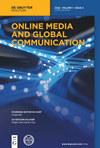Gen Z’s social media use and global communication
引用次数: 0
Abstract
Generation Z (Gen Z), also named digital natives, is the first to have been born after the mass-adoption of the Internet, especially the social media. Through all kinds of international digital platforms, Gen Z has more access to a vast number of diverse information than previous generations. Interconnected onworldmedia platforms, Gen Z has become a generation doing Internet-based communication from a young age. Exposed to global communication platforms, especially global social media platforms, such as Twitter, Facebook, Instagram, YouTube, TikTok etc., how Gen Z’s perceptions and attitudes are shaped by online content from all over the world is important to study. However, either studies about Gen Z’s online media use and their perceptions of another country or comparative studies across countries are scarce. Furthermore, studies focus on Gen Z’s media use in a global context, especially news consumption, is of vital importance to the understanding of the world. Our journal, OMGC, made some efforts this year to fill this gap. We organized a preconference at the 2023 Annual conference of the International Communication Association (ICA) in Toronto, Canada. In his keynote speech of our preconference titled, “Zoomers, Millennials, Gen X and Boomers? The News Finds Me Perception as aMedia Effect Equalizer and Implications on Global Communication,”Homero Gil de Zuniga proposed a model of media use of young people. He argued that in a social media age, Generation Z, instead of searching for news, rely on “news finds me”. In addition, two panels, “Media Use and Gen Z’s World View” and “Children and News: Lessons Learnt and Future Directions” as well as 14 papers with topics such as the effects of social media use and international news on Gen Z’s world view, politics and Gen Z’s media use, artificial intelligence and Gen Z, digital activism and Gen Z, and cross-generational comparisons were presented at the preconference. See our full preconference program at https://omgc.shisu.edu.cn/8e/63/c12420a167523/page.htm.Z世代的社交媒体使用和全球交流
本文章由计算机程序翻译,如有差异,请以英文原文为准。
求助全文
约1分钟内获得全文
求助全文
来源期刊

Online Media and Global Communication
Communication, Media Studies, Internet Studies, International Studies, International Relations-
自引率
0.00%
发文量
0
期刊介绍:
Online Media and Global Communication (OMGC) is a new venue for high quality articles on theories and methods about the role of online media in global communication. This journal is sponsored by the Center for Global Public Opinion Research of China and School of Journalism and Communication, Shanghai International Studies University, China. It is published solely online in English. The journal aims to serve as an academic bridge in the research of online media and global communication between the dominating English-speaking world and the non-English speaking world that has remained mostly invisible due to language barriers. Through its structured abstracts for all research articles and uniform keyword system in the United Nations’ official six languages plus Japanese and German (Arabic, Chinese, English, French, Russian, Spanish, Japanese, and German), the journal provides a highly accessible platform to users worldwide. Its unique dual track single-blind and double-blind review system facilitates manuscript reviews with different levels of author identities. OMGC publishes review essays on the state-of-the-art in online media and global communication research in different countries and regions, original research papers on topics related online media and global communication and translated articles from non-English speaking Global South. It strives to be a leading platform for scientific exchange in online media and global communication.
For events and more, consider following us on Twitter at https://twitter.com/OMGCJOURNAL.
Topics
OMGC publishes high quality, innovative and original research on global communication especially in the use of global online media platforms such as Facebook, TikTok, YouTube, Twitter, Instagram, WhatsApp, Weibo, WeChat, Wikipedia, web sites, blogs, etc. This journal will address the contemporary concerns about the effects and operations of global digital media platforms on international relations, international public opinion, fake news and propaganda dissemination, diaspora communication, consumer behavior as well as the balance of voices in the world. Comparative research across countries are particularly welcome. Empirical research is preferred over conceptual papers.
Article Formats
In addition to the standard research article format, the Journal includes the following formats:
● One translation paper selected from Non-English Journals that with high quality as “Gems from the Global South” per issue
● One review essay on current state of research in online media and global communication in a country or region
 求助内容:
求助内容: 应助结果提醒方式:
应助结果提醒方式:


